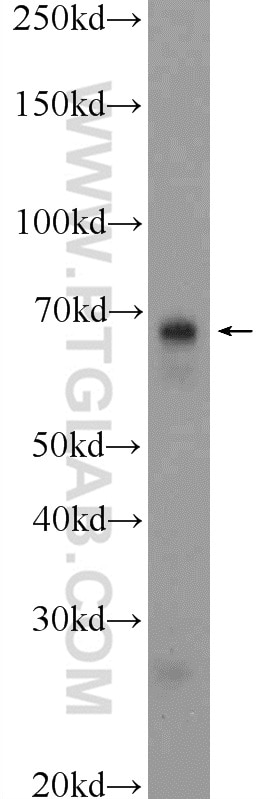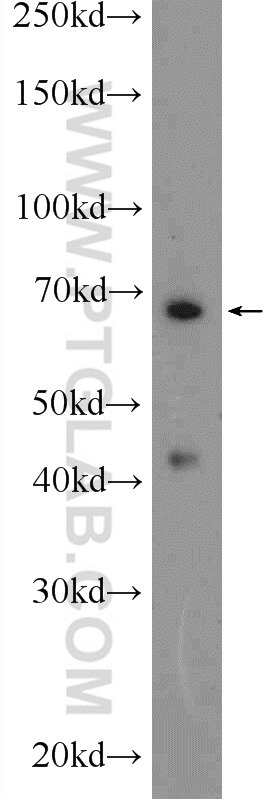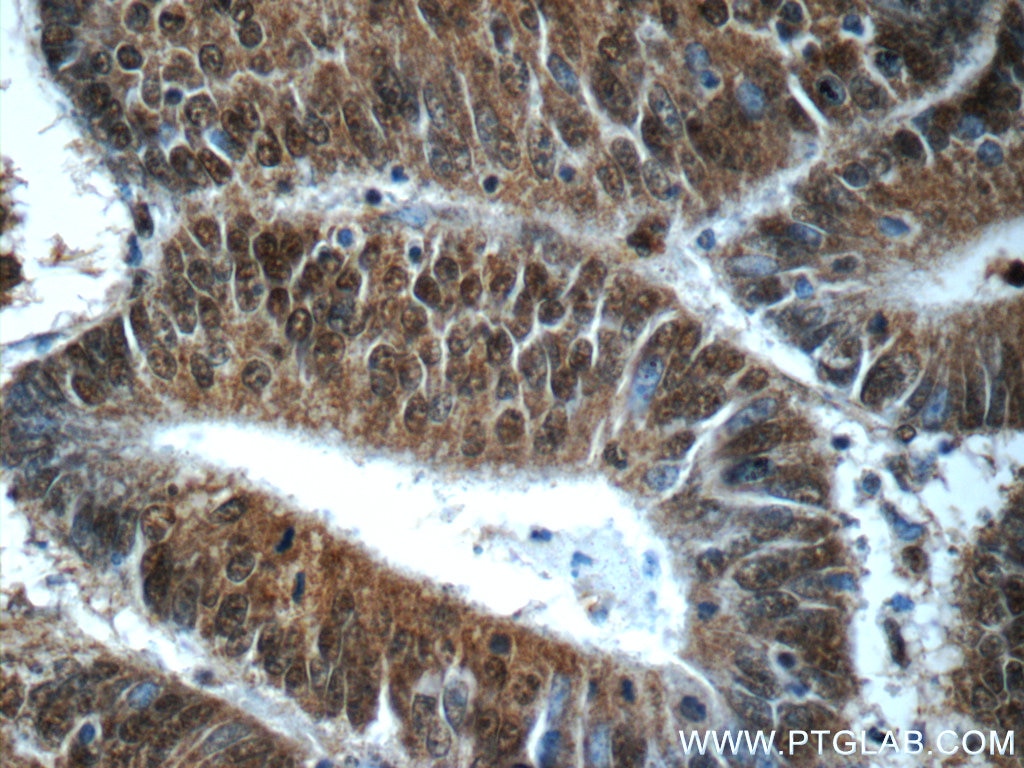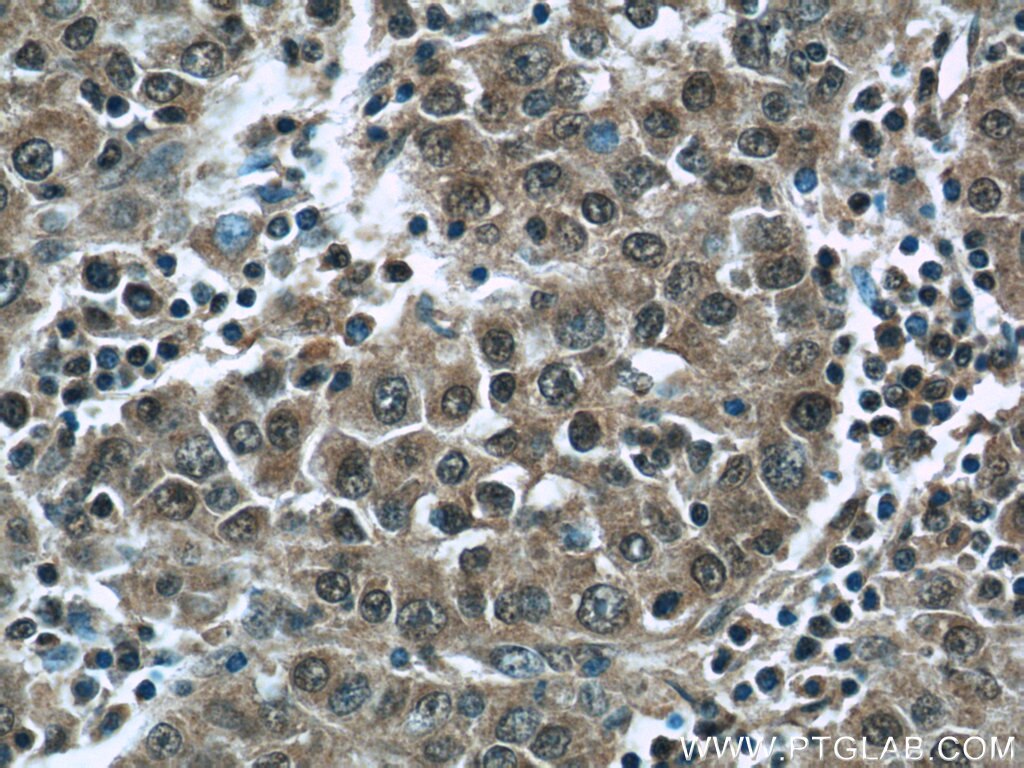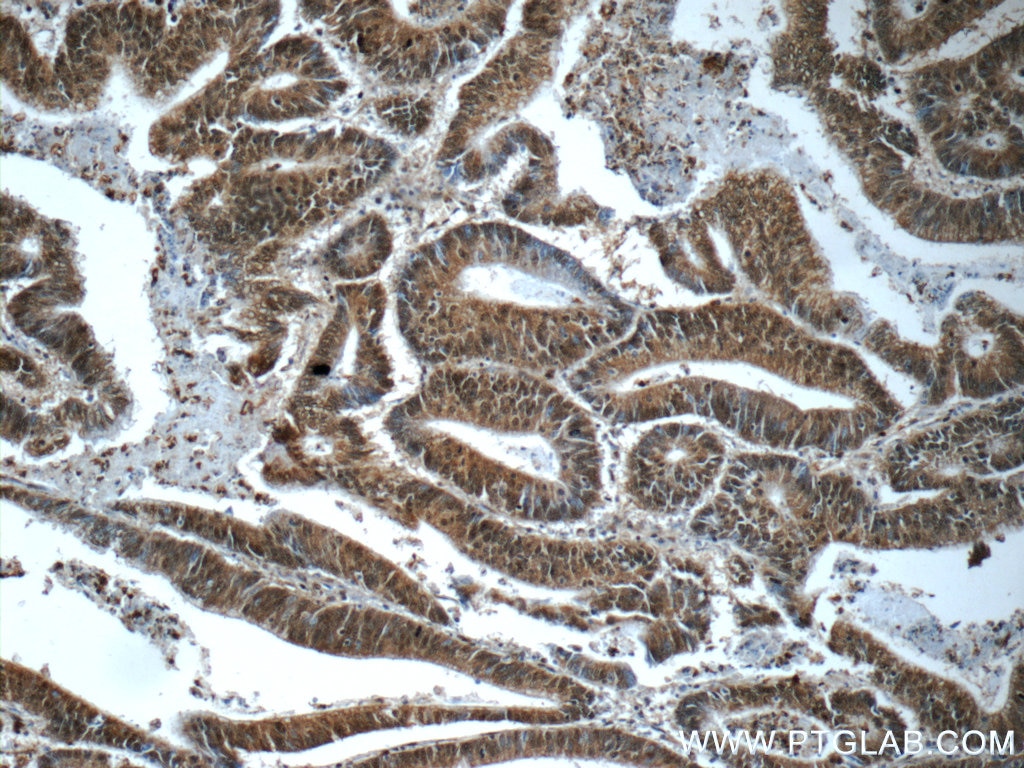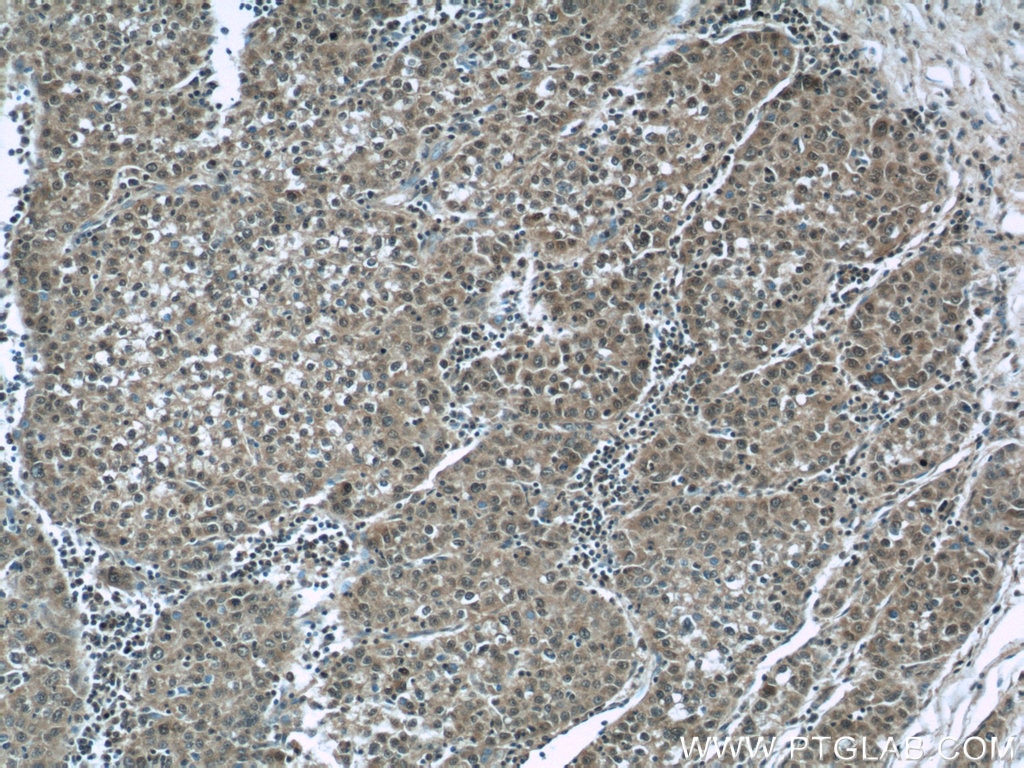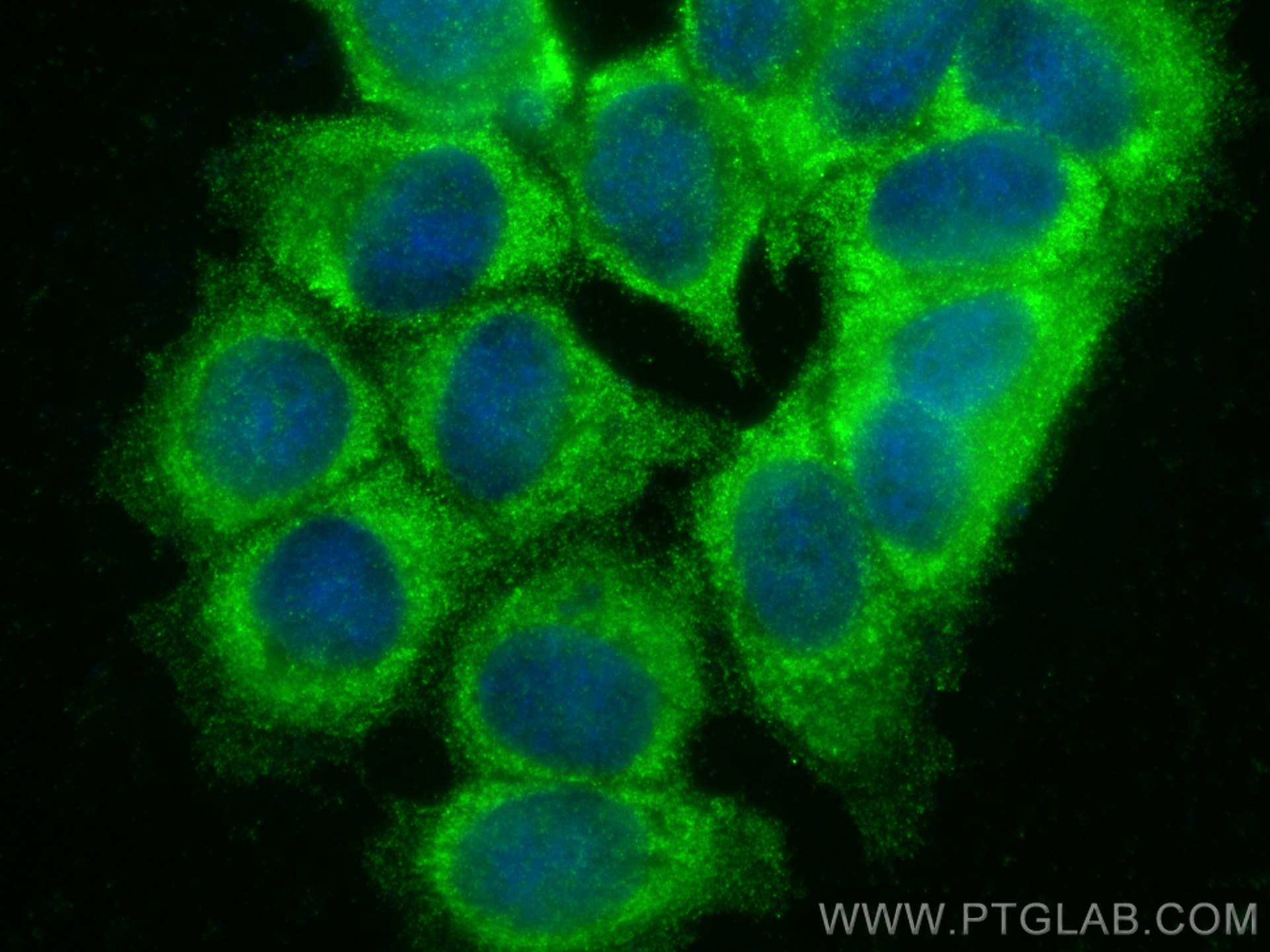HDAC10 Polyklonaler Antikörper
HDAC10 Polyklonal Antikörper für WB, IHC, IF/ICC, ELISA
Wirt / Isotyp
Kaninchen / IgG
Getestete Reaktivität
human, Maus, Ratte
Anwendung
WB, IHC, IF/ICC, IP, ELISA
Konjugation
Unkonjugiert
Kat-Nr. : 24913-1-AP
Synonyme
Geprüfte Anwendungen
| Erfolgreiche Detektion in WB | fetales humanes Hirngewebe, Maus-Thymusgewebe |
| Erfolgreiche Detektion in IHC | humanes Kolonkarzinomgewebe, humanes Leberkarzinomgewebe Hinweis: Antigendemaskierung mit TE-Puffer pH 9,0 empfohlen. (*) Wahlweise kann die Antigendemaskierung auch mit Citratpuffer pH 6,0 erfolgen. |
| Erfolgreiche Detektion in IF/ICC | MCF-7-Zellen |
Empfohlene Verdünnung
| Anwendung | Verdünnung |
|---|---|
| Western Blot (WB) | WB : 1:500-1:1000 |
| Immunhistochemie (IHC) | IHC : 1:20-1:200 |
| Immunfluoreszenz (IF)/ICC | IF/ICC : 1:50-1:500 |
| It is recommended that this reagent should be titrated in each testing system to obtain optimal results. | |
| Sample-dependent, check data in validation data gallery | |
Veröffentlichte Anwendungen
| KD/KO | See 1 publications below |
| WB | See 5 publications below |
| IHC | See 4 publications below |
| IF | See 1 publications below |
| IP | See 1 publications below |
Produktinformation
24913-1-AP bindet in WB, IHC, IF/ICC, IP, ELISA HDAC10 und zeigt Reaktivität mit human, Maus, Ratten
| Getestete Reaktivität | human, Maus, Ratte |
| In Publikationen genannte Reaktivität | human, Maus, Ratte |
| Wirt / Isotyp | Kaninchen / IgG |
| Klonalität | Polyklonal |
| Typ | Antikörper |
| Immunogen | HDAC10 fusion protein Ag18470 |
| Vollständiger Name | histone deacetylase 10 |
| Berechnetes Molekulargewicht | 669 aa, 71 kDa |
| Beobachtetes Molekulargewicht | 68 kDa |
| GenBank-Zugangsnummer | BC125083 |
| Gene symbol | HDAC10 |
| Gene ID (NCBI) | 83933 |
| Konjugation | Unkonjugiert |
| Form | Liquid |
| Reinigungsmethode | Antigen-Affinitätsreinigung |
| Lagerungspuffer | PBS with 0.02% sodium azide and 50% glycerol |
| Lagerungsbedingungen | Bei -20°C lagern. Nach dem Versand ein Jahr lang stabil Aliquotieren ist bei -20oC Lagerung nicht notwendig. 20ul Größen enthalten 0,1% BSA. |
Hintergrundinformationen
HDAC10, also named as Histone deacetylase 10, is a 669 amino acid protein, which is widely expressed with high levels in liver and kidney. HDAC10, which belongs to the class IIb subfamily, has an active deacetylase domain (DAC) and a catalytically inactive leucine-rich domain (LRD). HDAC10 is determined that it plays a role in homologous recombination, promotes autophagy and survival in neuroblastoma cells, suppresses cervical cancer metastasis and facilitates the cell cycle.
Protokolle
| PRODUKTSPEZIFISCHE PROTOKOLLE | |
|---|---|
| WB protocol for HDAC10 antibody 24913-1-AP | Protokoll herunterladen |
| IHC protocol for HDAC10 antibody 24913-1-AP | Protokoll herunterladenl |
| IF protocol for HDAC10 antibody 24913-1-AP | Protokoll herunterladen |
| STANDARD-PROTOKOLLE | |
|---|---|
| Klicken Sie hier, um unsere Standardprotokolle anzuzeigen |
Publikationen
| Species | Application | Title |
|---|---|---|
Kidney Int Histone deacetylase 4 selectively contributes to podocyte injury in diabetic nephropathy. | ||
Oncol Lett HDAC10 expression is associated with DNA mismatch repair gene and is a predictor of good prognosis in colon carcinoma. | ||
Cell Death Dis WNT5A promotes the metastasis of esophageal squamous cell carcinoma by activating the HDAC7/SNAIL signaling pathway. | ||
J Cell Mol Med RNA m5C methylation orchestrates BLCA progression via macrophage reprogramming | ||
Discov Oncol Elevated histone deacetylase 10 expression promotes the progression of clear cell renal cell carcinoma by Notch-1-PTEN signaling axis | ||
Cell Commun Signal HDAC10 switches NLRP3 modification from acetylation to ubiquitination and attenuates acute inflammatory diseases
|
